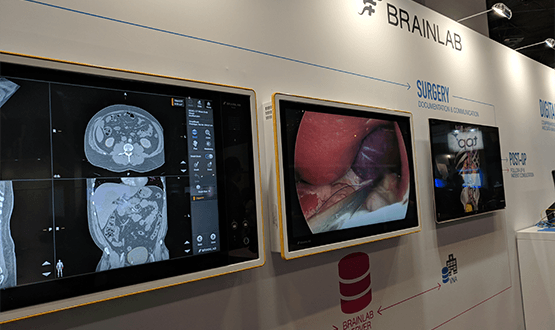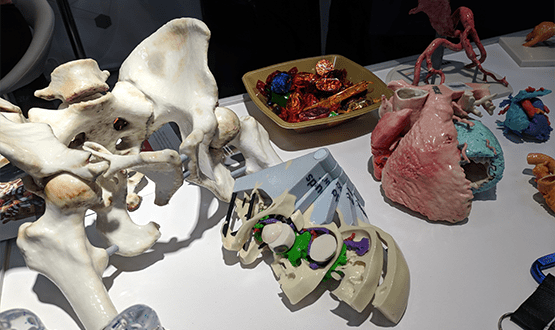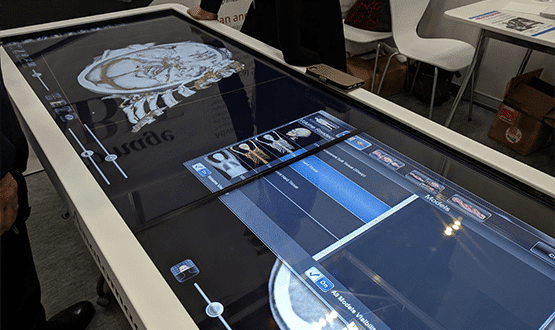Aside from a number of speeches and announcements, those who attended EHI Live 2017 could also browse a number of exhibitions with some displaying the latest health technologies. From virtual operating tables to mobile libraries – here is a round-up of some of the best.
Anatomage
The Anatomage Table can best be described as a highly sophisticated, life-sized version of the classic kids’ game, Operation.
The is fully touch screen virtual dissection table provides a detailed visualisation of the human anatomy, serving as an educational tool, radiology workstation and a tool for surgical case review, patient consultation and medical research.
The detailed rendering of anatomy is possible through Anatomage’s unique rendering algorithms, and is capable of reading images from 3D DICOM data such as CT and MRI scans.
BrainLab
BrainLab is a Munich-based medical software company that provides SAAS-like applications to medical professionals in the fields of neurosurgery, radiosurgery and radiotherapy, orthopaedics, ENT, CMF, spine and trauma.
Primarily, its medical technology is aimed at providing less invasive patient treatment, more effective pre-planning for complex surgery and easier access to surgical data on-the-fly.
BrainLab has three core business areas: surgery, radiosurgery and digital O.R.
It offers workflow-tailored software packages on a subscription basis, meaning hospitals can select the services they need rather than having to purchase large software packages with elements they may not.

TeraRecon
TeraRecon is an independent and vendor-neutral radiology software with a primary focus on 3D reconstruction and post-processing.
In a nutshell, the company provides medical image viewing technology that offers a complete cross-section view of the human body, which can be used as training tools for clinicians.
The company has specifically designed workflows for all the 3D needs of a hospital, including radiology, cardiology, vascular, and oncology.
The company has also incorporated the Microsoft HoloLens and 3D printing into its software, which can be integrated into healthcare providers’ existing PACS and VNAs.
Medhand
Mobile library Medhand were at the exhibition to demonstrate their app which allows users to access a number of medical titles offline on their mobile or tablet device.
Features include bookmarking, ability to highlight and add annotations as well as inbuild specialist dictionaries.
Subscribers also get the added benefit of being able to add their own content, for example an NHS trust can have their own guidelines on illnesses such as sepsis added to their library.
This means healthcare professionals have quick and easy access to medical resources and can choose from hundreds of trusted titles.
Baby Buddy
New or expecting parents are able to access verified information thanks to a new app which was being promoted at EHI Live.
Baby Buddy serves as a personal baby expert and helps guide parents through pregnancy and the first six months of their baby’s life.
The free app was created by child health and wellbeing charity Best Beginnings and is endorsed by the Department of Health.
Features of the app include an ‘Ask Me’ tool which allows parents to ask questions which will get answers with expert information.
Parents can also record their own ‘Bump Book’ where they can share their own thoughts and feelings.
There is also a feature which reminds parents about appointments and a ‘remember to ask’ tool which serves as a reminder list for questions they might want to ask at their next appointment.

Two-day event wrap:
A number of key issues dominated the two-day conference in Birmingham, including cyber security.
During the first day, healthcare executives drove home the need to adopt new ways of working to protect themselves against cyber-threats.
Charles Gutteridge, chief clinical information officer (CCIO) of Barts Health NHS Trust and Matthew Connor, head of IT at Southport and Ormskirk NHS Trust, shared their experiences of the WannaCry ransomware outbreak which caused widespread disruption to England’s health services in May.
Inderjit Singh , NHS England’s head of architecture and cyber security also announced the need for Board level recognition in response to WannaCry.

